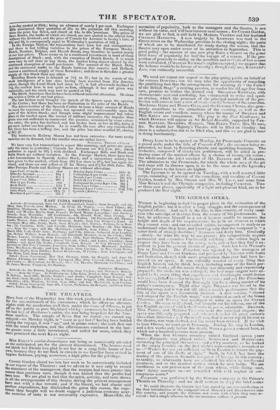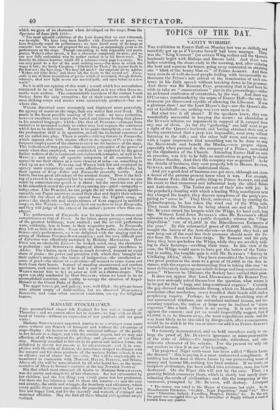THE GERMAN OPERA.
WEBER is beginning to find his proper place in the estimation of the English public ; but it is alter a long qruggle, and the consequence of repeated efforts. And such is the fate, in this country, of every musi- cian who outstrips or deviates front the course of his predecessors. In fact, lie addresses himself to a set of hearers unable to measure the height and depth of his acquirements : lie is in an element to win& they cannot soar ; and our so-called critics, incompetent to analyze or understand what they hear, and knowing only that the composer is " a setter forth of strange doctrines," denounce and decry him. . Gradually —slowly—he wins his way to acceptance : his compositunis acquire permanent and extensive Continental celebrity : the critics begin to suspect they have been on the wrong tack, and at last they find it ex- pedient to join the general chorus of praise. Such has been WEBER'S fate ha England. Bev Fricseklitz was rejected by the managers of Drury Lane and Covent Garden ; and produced by AnNotas with doubt and hesitation, though with more preparation than ever had been be- stowed on an opera. It was carefully weeded of every thing that English hearers might think heavy, including some of the finest por- tions of the work ; all the scenic display was diligently and expensively prepared ; the orchei-tra was enlarged; the best stage-singers were en- gaged in it ; every thing that experience and forethought could .dewse was accomplished in order to insure success : and yet Der remehutz would have been damned the first night but for a strong muster of its author's countrymen. Night after night Pitswe i s was hissed in the drinking-song, and it was not till :tact a weck's performance that the fate of the opera was favourably decided. A new version, "altered and adapted for the Eng.lish stage," was produced at each of the Great Theatres ; :old Wnimi was employed to write an opera for Covent Garden. He came In England, and brought out his Oberon, one of the few English operas (,f Ilidl the litiretto is, per se, admirable. BRAIIAN, Miss PATON, and Madame Vs.:s.rtos, were the principal singers ; the opera was diligently prepared end rehearsed, under its great author's immediate direction : and the result was, that it never repaid its cost to the theatre, was soon shelved, and has never been revived. If we wish to hear Oberon, we must go to Germany. During his stay in London, and a few weeks only before his death, Wistimt gave a concert here, at which not a hundred persons were present. When the first German companv visited England—seven years since—Eurymthe was played twice ; Si ltroloElt and lla rrzioxooknea sustaining the principal characters : and a C amateur, City aater, as he looked at the empty benches on the first night's roprckentatiom remarked to us—" WEBER has not yet sufficient credit in London to insure the pay- ment of one of his drafts at sight." Such, in brief, has been the destiny of the greatest dramatic compostrr t,f his age in this country; so tardily, so reluctantly have we elaitted his claim to intellectual greatness, and to the nsusical staiit,11 which he now holds. We are vociferous in our praises now of the man whom, while living—and, alas t dying amongst its—we rewarded with cold neglect or con- temptuous scorn.* Buryantbe was performed by the German company at the Prince's Theatre on Thursday : and we shall venture to copy the brief notice * We could illustrate time historic fact lien' stated by our own recollection of the first introduction of the compositions of MOZART and BLETIIOVEN into this country, and narrate the derision mid worn With whirl: they were re-
ceived : but a simple allusion to the cirCumstunee .;t present.
which we gave of its character when developed on the stage,Irom the Spectator of June 29th 1833- " The most splendid exhibition of the 'pie drama that we ever witnessed, was to-night. 'We have long been familiar with Eurganthe on paper; we bare frequently urged its performance; we have heard sonic of its songs at concerts : but we were not prepared for any thing so surpassingly great as its performance on the stage. Though resembling, in bold originality and poetic genius, '\Veber's other operas, it has a character completely its own ; and we can now fully understand why its author ranked it as his finest work. To describe its various beauties would fill a volume—every page is a study. We can only point to a few of the most striking ones,—the scene in which the wager is laid ; the lovely Cavatina, Thale;' the joyous finale to the first act; the bass song, 4Wo berg' ich mich ?' the exquisite air by Adolar, • Weben min liifte Rub;' and above all, the finale to the second act. Eurg- anew is one of those emanations of genius which at occasional, though distant, intervals, shed new light across our musical path, and open beffire us a new world."
Such is still our opinion of this work ; a work which has nevertheless continued to be as little known in England as it was when these re- marks were written. The commendable exertions of the extinct Vocal Society form the only exception ; for at their concerts nearly all the most striking songs and scenes were successively produced—but no- where else.
WEnEn discerned more accurately and displayed more powerfully the agency of music on the stage, than any writer that ever lived. His music is the finest possible reading of the words: no mere recitation, however excellent, can impart the varied and intense feeling that glows in his musical language ; which—like that of PURCELL—changes from recitative to measured melody as either may best express the sentiment
which has to be delivered. Nature is his guide throughout, even where the profoundest skill is in operation, and all the technical resources of art are called into play. There is another striking feature in Enuanthe, which appears also with similar effect in the operas of P
frequent employment of the chorus to carry on the business of the stage. This indication of true genius—this accurate perception of the power of music when thus employed, was overlooked or neglected by the great Italian writers of the seventeenth and eighteenth centuries, as well as by HANDEL : and nearly all operatic composers of all countries have agreed to use their chorus as it mere element of noise—as something to wind up an act with. PURCELL and WEBER both felt and employed its agency more extensively and more effectively—how effectively, let their operas of King Arthur and Euqaulhe severally testify. And herein lies one great advantage of the musical drama. How is the feel- ing of a crowd to be expressed but by words sung ? The utmost we can reach by consentaneous speech is a shout : but the musician can give
to his assembled crowd the power of expressing joy—grief—sympathy- indignation. Like PURCELL, he can people the air with unseen spirits—
assemble our Pagan ancestors around their altar and depict their solemn rites—bid the shout of defiance ascend from the English army, or present the shepherds and shepherdesses of Kent engaged in mirthful song ; or, like WEBER—but we exhort our readers to hear Eurgauthe, and they will judge of the extent of its author's powers when thus em- ployed. The performance of Ear?/maths was far superior in correctness and completeness to that of Faust. In the latter, many passages, and those of the greatest brilliancy, were omitted ; and the several performers were, evidently, less at home in their respective parts. In En/wan/he
they left us little to desire. Even with the ineffaceable recollection of SCHIBEDER'S performance, we were delighted with the singing and the
acting of Madame FISCHER SC H WAIVARiiCK ; and the very difficult part of Eglantine was effectively sustained by Madame Mictim.osi. Herr Keit was an admirable Lysiart—he looked, acted, sang the character, to perfection : and SCHMETZER displayed almost equal excellence in Molar. The Chorus, upon whom so much devolved, demand an equal share of praise : the power and precision with which they brought out their author's meaning—the bursts of indignation—the smothered ac• cents of grief—the shouts of exuPation—all seemed to come warm and fresh from their hearts. Instead of standing unconcerned and careless spectators, each seemed as if he had a part to perform, and to be (as WEBER meant him to be) an actor as well as a chorus-singer. The opera was ably conducted by Herr STnAuss ; whom we know to be an accomplished musician, and worthy to occupy the situation of Kapel- Meister to the Grand Duke of Baden.
The upper boxes, pit, and gallery, were well filled : the private boxes were almost empty of fashionables, but we observed Mosennr,Es, BARNETT, and EOM other eminent musicians, among the delighted hearers.



























 Previous page
Previous page